|
|
|
Sort Order |
|
|
|
Items / Page
|
|
|
|
|
|
|
| Srl | Item |
| 1 |
ID:
099899


|
|
|
|
|
| Publication |
2010.
|
| Summary/Abstract |
America won an asymmetric war in Iraq and lost an asymmetric peace. Translating material power advantage into favourable political outcomes has been a challenge for great powers down the ages-what makes this bridge even more difficult to cross today is the raised expectations on the part of liberal publics about the moral purpose of US-led interventions. In this sense, Iraq is part of the explanation for why influential liberals believe there is a 'crisis' in America's world leadership. 'America after Iraq' subjects this claim to analytical scrutiny-in particular it addresses whether Iraq was simply a chapter in a longer book detailing American power and purpose in the post-9/11 world? In answering this question the article is drawn to consider conceptual debates about a shift in the international system from anarchy to hierarchy with the US as the hegemonic power. While it rejects strong versions of the hierarchy thesis that imply the Washington is the new Rome, it is nevertheless drawn to an understanding of a hierarchical form of ordering where the US oscillates between a hegemonic role and an imperial outlaw. Seen through this lens, the Iraq War was an intervention that happened because it could, and not because it was just or necessary. Public opinion and the weakness of domestic institutions are also critical factors in explaining how it was possible for a previously status-quo oriented hegemonic power to act recklessly and put the rules and institutions of international society under strain.
|
|
|
|
|
|
|
|
|
|
|
|
|
|
|
|
| 2 |
ID:
104320
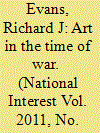

|
|
|
|
|
| Publication |
2011.
|
| Summary/Abstract |
THE LOOTING of artifacts and cultural objects in times of war and violent political upheaval continues to arouse international concern in the twenty-first century just as it did in the twentieth. The plunder of archaeological sites in Egypt during the recent revolution (after they were abruptly abandoned by teams of archaeologists who were understandably concerned about their personal safety) is only the latest example. In Afghanistan and Iraq too, war was followed by the wholesale looting of museums and other sites, and it was not long before plundered objects began to find their way into collections in the West.
|
|
|
|
|
|
|
|
|
|
|
|
|
|
|
|
| 3 |
ID:
116771
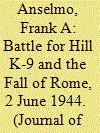

|
|
|
|
|
| Publication |
2012.
|
| Summary/Abstract |
In the U.S. 179th Infantry Regiment's official history, Warren P. Munsell, Jr., describes a major battle on 2 June 1944, when companies F and G of the second battalion captured and secured the heavily defended Hill K-9 south of Rome. However, on 9 June 1944, a second lieutenant in the first battalion's B Company wrote that his company captured and secured Hill K-9. Using military records and eyewitness accounts, I attempt to determine which unit actually took, secured, and held Hill K-9-an essentially forgotten battle that nevertheless played a major role in Rome's fall two days later.
|
|
|
|
|
|
|
|
|
|
|
|
|
|
|
|
| 4 |
ID:
112337
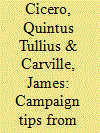

|
|
|
|
|
| Publication |
2012.
|
| Summary/Abstract |
In 64 BC, the great Roman lawyer and orator Marcus Tullius Cicero ran for consul. His younger brother, Quintus, thought Marcus had a chance -- as long as he ran a good campaign. So Quintus wrote a detailed strategy memo laying out just what Marcus needed to do to win. It's the best guide to electioneering you'll ever read, presented here with a commentary by the legendary political consultant James Carville.
|
|
|
|
|
|
|
|
|
|
|
|
|
|
|
|
| 5 |
ID:
111818
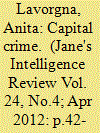

|
|
|
| 6 |
ID:
067244
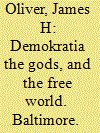

|
|
|
|
|
| Publication |
Baltimore, Johns Hopkins Press, 1960.
|
| Description |
viii, 192p.Hbk
|
|
|
|
|
|
|
|
|
|
|
|
Copies: C:1/I:0,R:0,Q:0
Circulation
| Accession# | Call# | Current Location | Status | Policy | Location |
| 005957 | 938/OLI 005957 | Main | On Shelf | General | |
|
|
|
|
| 7 |
ID:
096051
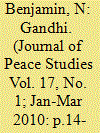

|
|
|
| 8 |
ID:
119464
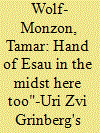

|
|
|
|
|
| Publication |
2013.
|
| Summary/Abstract |
The article explores the poet Uri Zvi Grinberg's attitude towards Jerusalem, as reflected in his poem "A Great Fear and the Moon", the first he wrote following his immigration to Eretz Israel. The reconstruction process references political-historical contexts on the background of the first decade of the British Mandate, which Grinberg viewed as the reincarnation of Rome, scion of the kingdom of Edom.
|
|
|
|
|
|
|
|
|
|
|
|
|
|
|
|
| 9 |
ID:
111923
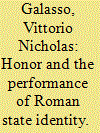

|
|
|
|
|
| Publication |
2012.
|
| Summary/Abstract |
Are the personal identities of elite decision makers a domestic source of state identity? This article explores this question and reveals how state identity was produced in the Roman world system during the early Principate.† The argument advanced proposes the Roman world was ensconced by a metavalue of honor that significantly shaped the personal identities of Rome's aristocratic decision-making classes. Competition for honor subsumed aristocratic life and shaped not only the personal identities of the elite, but also the persona of the Roman state. The Romans extrapolated their psychological framework, in which the stratification of domestic society rested on personal identities of honor, to their outlook on foreign policy. Akin to their domestic lives, those executing foreign policy conceptualized Rome as engaged in a status competition for honor with the polities existing its world system. Preserving and enhancing one's honor relative to others was fundamental in domestic life, and this was also the state's primary objective in relation to all others. The identity of the Roman state, therefore, was an aggressive status seeker.
|
|
|
|
|
|
|
|
|
|
|
|
|
|
|
|
| 10 |
ID:
185602
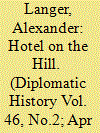

|
|
|
|
|
| Summary/Abstract |
We mean these hotels as a challenge,” Conrad Hilton said in Hilton Hotel Corporation’s in-house magazine Hiltonitems in 1955, “not to the peoples who have so cordially welcomed us into their midst—but to the way of life preached by the Communist world.”1 In his 1958 “President’s Corner” column, the President of the Hilton Hotels Corporation asked “why is Hilton building hotels in all these key spots around the world? Why? Because there is a job to be done there.” That job was winning the Cold War. Winning the Cold War would require an economic and cultural offensive, an offensive led by Hilton Hotels International. Conrad Hilton believed that, above all, the Cold War was an ideological conflict, and the success of his hotels would prove that communism was a lie.
|
|
|
|
|
|
|
|
|
|
|
|
|
|
|
|
| 11 |
ID:
172360
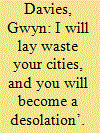

|
|
|
|
|
| Summary/Abstract |
This article examines the two major and prolonged insurgencies that the Roman empire faced in Judaea in the first and second centuries C.E. It seeks to explain the historical contexts for these conflicts and to discuss the strategies pursued by both the imperial power and its insurgent enemies. In each case, once insurrection had broken out, the Roman authorities proceeded in a methodical manner involving the concentration of maximum force to achieve the goal of suppression. On the other hand, their Jewish enemies sought out adaptive responses that took account of the overwhelming imperial strength and applied the lessons learned from the failure of the First Revolt to re-imagine the course of opposition in the Second. The use of exemplary violence as a coercive tool of policy is discussed as is the challenge of dealing with an internally fractured and factionalized population.
|
|
|
|
|
|
|
|
|
|
|
|
|
|
|
|
| 12 |
ID:
090606
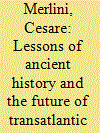

|
|
|
|
|
| Publication |
2009.
|
| Summary/Abstract |
While a global recession of uncertain duration plagues the planet, the Atlantic countries are faced with an agenda of complicated, almost intractable international challenges. The surge of new protagonists on the world scene has been largely the result of a long period of relative stability and extraordinary economic growth thanks to the prevalence of Western paradigms. And yet they mark another step in the shrinking of the West's geostrategic relevance. Obama's America and half-integrated Europe should deal with this new multipolar world with a consistent and synergic approach, made up of a mix of traditional balance-of-power skills and systemic innovations. Over the past two decades, the US' solitary position at the apex of global power has made the analogy with imperial Rome common currency. While this is the wrong lesson to learn from classical history, the achievements and mistakes of ancient Greece and republican as well as imperial Rome may still help us, third millennium Europeans and Americans, sail through the stormy waters of today's planetary Mediterranean.
|
|
|
|
|
|
|
|
|
|
|
|
|
|
|
|
| 13 |
ID:
086913
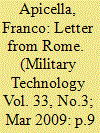

|
|
|
|
|
| Publication |
2009.
|
| Summary/Abstract |
The Supreme Defence Council, which is the highest Italian decision-making body in defence policy matters and is chaired by the President of the Republic, met on the 29th of january last.
|
|
|
|
|
|
|
|
|
|
|
|
|
|
|
|
| 14 |
ID:
110036
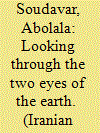

|
|
|
|
|
| Publication |
2012.
|
| Summary/Abstract |
Matthew Canepa's recent study of the cultural and political interactions between Rome and Sasanian Iran, has provided an opportunity to reassess Sasanian rock reliefs in light of the claims and counter claims between these two empires. Since victory over Romans meant a victory over an-Eran, and generated the most potent of all farrs, i.e. the Aryan farr, many rock reliefs were conceived to show its reflection on the king. What is most interesting, though, is the array of nuances that are incorporated in them to account for the differences that were particular to each situation.
|
|
|
|
|
|
|
|
|
|
|
|
|
|
|
|
| 15 |
ID:
144576
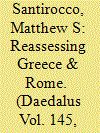

|
|
|
| 16 |
ID:
152217
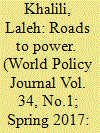

|
|
|
| 17 |
ID:
100741
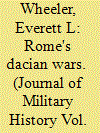

|
|
|
|
|
| Summary/Abstract |
wo recent major monographs, one on the Dacian wars of Domitian and Trajan (Stefan) and another on ancient migrations from the Ukraine into the eastern Balkans (Batty, Rome and the Nomads) invite discussion and evaluation. A survey of the problematic literary and archaeological sources (not least Trajan's Column) for the history of this area in the first and second centuries A.D. prefaces an evaluation of new archaeological evidence on Dacian defenses and innovative topographical identifications. The development of a Geto-Dacian state in Transylvania within the context of multiple ethnicities on the Lower and Middle Danube is discussed and use of new archaeological discoveries to clarify narratives of the wars of 84-89, 101-102, and 105-106 is evaluated. Interpretations of scenes on Trajan's Column and the metopes of the Adamklissi monument remain controversial.
|
|
|
|
|
|
|
|
|
|
|
|
|
|
|
|
| 18 |
ID:
102877
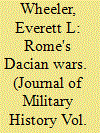

|
|
|
| 19 |
ID:
097834
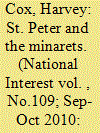

|
|
|
|
|
| Publication |
2010.
|
| Summary/Abstract |
URBI ET Orbi ("for the city and for the world") is the traditional blessing the pope offers on special occasions. Although he has at times pronounced it in other venues-St. John Lateran, the pope's official ecclesiastical seat, or the Quirinale, now the Italian president's residence-the pontiff usually intones the prayer from the balcony overlooking St. Peter's Square. The ancient ceremony reminds us that the pope holds office as head of the Church because he has been elected bishop of "the city," Rome; that he is the leader of a global organization whose very name, "Catholic," means universal (making the whole world his parish); and that he is the head of a miniscule but internationally recognized sovereign state.
|
|
|
|
|
|
|
|
|
|
|
|
|
|
|
|
| 20 |
ID:
189346
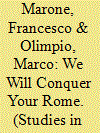

|
|
|
|
|
| Summary/Abstract |
Over the last few years, Italy has occupied a relatively marginal position with respect to the jihadist threat. Nonetheless, the propaganda of the Islamic State mentions Italy and the bordering Vatican with a seemingly disproportionate frequency. This article presents an in-depth analysis of all textual references in Dabiq and Rumiyah, the flagship magazines of this sophisticated jihadist organization. Overall, several mentions concern “Rome,” intended as a symbol for the West and Christianity and with a number of other meanings. However, there is no lack of potentially worrying references to Italy, Italians, the Vatican, and the Pope.
|
|
|
|
|
|
|
|
|
|
|
|
|
|
|
|
|
|
|
|
|